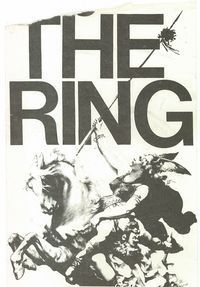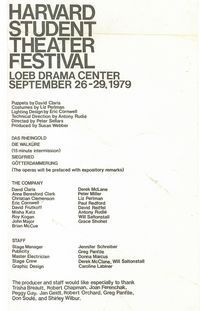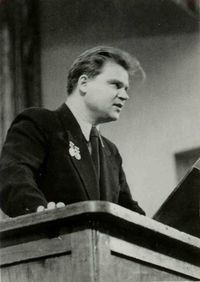Alex Ross's Blog, page 169
June 18, 2013
Exile in Ritesville
Immortality of a sort
I'm flattered to find that my 1995 snapshot of the Aldeburgh beach has shown up in someone's YouTube video of the Sea Interludes from Peter Grimes. The famous beach is presently the setting for Tim Albery's brave and apparently successful outdoor staging of Grimes.
June 16, 2013
Fear of the gadget
"This eternal piano-playing is too much to bear! ... These
shrill tinkle-tones with no natural resonance, these heartless whirring-tones,
this arch-prosaic rumbling and hacking — the fortepiano is killing all our
thoughts and feelings, and we are becoming stupid, dull, imbecilic. This
prevalence of piano playing, not to speak of the triumphal march of the piano virtuosos,
is characteristic of our time and truly bears witness to the victory of machine over spirit. Technical proficiency, the precision of an automaton, the
identification with strung wood, the sonic instrumentalization of human beings,
is now hailed and celebrated as the highest good.”
— Heinrich Heine, Paris, 1843
Heine being a master ironist, this jeremiad should be taken with a grain of salt. Nonetheless, the resemblance to modern-day denunciations of encroaching technology is amusing.
The Sellars Ring


Annals of American Wagneriana: Richard Lehnert sent me the program for Peter Sellars's legendary, unrecorded one-evening version of the Ring. Lisa Hirsch was there: "The giants were macramé, and you could see them only from the hips down, hung from the flies on the proscenium stage. The galloping Valkyries were children's hobby-horses, the magic provided by the best use of a disco ball I've ever seen in my life." More memories of early Sellars are here.
June 15, 2013
Baudelaire dancing about architecture
"I have often heard it said that music cannot boast of translating anything with certainty, as can writing and painting. This is true in a certain sense, but it is not entirely true. Music translates in its own way, through means which are its own. In music, as in painting and even the written word, which is still the most positive of the arts, there is always a lacuna to be filled in by the imagination of the listener."
— "Richard Wagner and Tannhäuser in Paris."
June 12, 2013
Summer reading
For the past couple of years, most of what I've read has been Wagnerism-related — about which I have no complaints, since my book will encompass much of the greatest literature of the late nineteenth and early twentieth centuries, as well as some of the weirdest. But I did drop everything to read Chimamanda Adichie's merciless, compassionate new novel Americanah. It tells of a young Nigerian woman who comes to America and, after a long struggle to find her footing, begins writing a blog on American racial neuroses. The perceptions on race are breathtaking, as various reviewers have noted; Ruth Franklin, in BookForum, delivers a particularly acute commentary. But I'd also like to put in a word for Adichie's style. I have a hard time with a lot of contemporary fiction; I've begun any number of acclaimed new novels, often by men self-consciously vying for the Great American Novel title, and stopped after thirty pages in a state of bored frustration. In an age of chronic overwriting, Adichie has found a voice that is noble, spare, shorn of show, at once uncommonly elegant and uncomfortably direct.
I'm also planning to read George Packer's The Unwinding, Edna O'Brien's Country Girl, Choire Sicha's Very Recent History, and David Margolick's Dreadful, about the dark, short life of John Horne Burns.
June 9, 2013
Schoenberg's aphorism revised
June 5, 2013
Miscellany: Ojai, Gesualdo's ghost, etc.
Mark Morris is set to unleash a winsome welter of events at this year's Ojai Festival, including the Bad Plus Rite (Ethan Iverson writes in advance here), a Lou Harrison gamelan program, the staggering new Morris dance Jenn and Spencer (to Henry Cowell), various works of John Luther Adams (Strange and Sacred Noise, songbirdsongs, For Lou Harrison), and a cache of Cage.... Adams will then proceed north for the world première of his big new orchestral piece Become Ocean, at the Seattle Symphony, June 20-23. This work is an outgrowth of Dark Waves.... The splashiest undertaking at this year's Make Music NY is a performance of R. Murray Schafer's Credo on Central Park Lake, with 144 singers under the direction of George Steele. Note also Melissa Elledge's all-accordion In C and a five-borough rendition of Cage's 49 Waltzes. The full schedule is here.... The eighteen-year-old Conrad Tao is a talent to watch, both as pianist and composer, as Voyages, his spiky debut EMI album, attests. Next week he is curating a three-day festival called Unplay, with his own works programmed alongside those of Tristan Perich, Phil Kline, Kate Davis, Julia Wolfe, and the like.... The Chelsea Music Festival also gets under way next week, with a focus on Britten; I'm especially intrigued by an Ensemble Amarcord program called The Ghost of Gesualdo.... Big early-music doings in June: the Boston Early Music Festival (June 9-16) will have a full staging of Handel's Almira; and the Festival Montréal Baroque (June 21-24) will feature the Ensemble Caprice in what may prove to be a controversial reconstruction of Vivaldi's Motezuma.... The full schedule for this year's Bang on a Can Marathon, on June 16, has been announced. David Lang's death speaks, with Shara Worden, is one highlight.... Martin Bresnick's first opera, My Friend's Story, has its premiere in New Haven on June 19.... The singular Laurie Anderson is curating a series of events at the River to River Festival, June 18-22.
June 4, 2013
The Khrennikov renaissance
 Back in 2007, on the occasion of the death of Tikhon Khrennikov, the longtime head of the Soviet Composers' Union, I offered a few thoughts on a widely maligned figure, taking note of scattered attempts to rehabilitate him. Was he the voice of ideological oppression, spreading misery through the ranks of his more gifted colleagues? Or did he quietly work to protect those colleagues from worse fates? Glancing through the most recent literature on Soviet music and composers, I don't see any clear consensus emerging. Kiril Tomoff's Creative Union, a history of the Composers' Union, yields a surprisingly positive portrait. Simon Morrison's recent work on and around Prokofiev — The People's Artist and the new book Lina and Serge, a moving biography of Prokofiev's first wife — puts Khrennikov in a generally unsympathetic light, yet records gestures of compassion on his part, such as his attempts to have Lina released from prison. (She was sent to the gulag in 1948.) Alexander Ivashkin, in the latest issue of the Paul Sacher Journal, has an acidulous account of Khrennikov's relationship with Stravinsky, exposing the bureaucrat's more absurd self-justifications. (Did you know that in 1962 Stravinsky embraced the idea of moving to the Soviet Union? So Khrennikov claimed.) Likewise, Khrennikov plays a less than heroic role in David Fanning's biography of Mieczysław Weinberg. Khrennikov often did not help his own case in his later interviews. "Don't forget there were many Jews in musical life and they launched unfair attacks on my compositions," he told Martin Sixsmith in 2006, before going on to praise Stalin.
Back in 2007, on the occasion of the death of Tikhon Khrennikov, the longtime head of the Soviet Composers' Union, I offered a few thoughts on a widely maligned figure, taking note of scattered attempts to rehabilitate him. Was he the voice of ideological oppression, spreading misery through the ranks of his more gifted colleagues? Or did he quietly work to protect those colleagues from worse fates? Glancing through the most recent literature on Soviet music and composers, I don't see any clear consensus emerging. Kiril Tomoff's Creative Union, a history of the Composers' Union, yields a surprisingly positive portrait. Simon Morrison's recent work on and around Prokofiev — The People's Artist and the new book Lina and Serge, a moving biography of Prokofiev's first wife — puts Khrennikov in a generally unsympathetic light, yet records gestures of compassion on his part, such as his attempts to have Lina released from prison. (She was sent to the gulag in 1948.) Alexander Ivashkin, in the latest issue of the Paul Sacher Journal, has an acidulous account of Khrennikov's relationship with Stravinsky, exposing the bureaucrat's more absurd self-justifications. (Did you know that in 1962 Stravinsky embraced the idea of moving to the Soviet Union? So Khrennikov claimed.) Likewise, Khrennikov plays a less than heroic role in David Fanning's biography of Mieczysław Weinberg. Khrennikov often did not help his own case in his later interviews. "Don't forget there were many Jews in musical life and they launched unfair attacks on my compositions," he told Martin Sixsmith in 2006, before going on to praise Stalin.
Even the most Khrennikov-friendly scholar, though, might balk at the formulation attached to an upcoming all-Khrennikov concert in St. Petersburg, to which David Shengold drew my attention: "Fate granted Tikhon Nikolaevich Khrennikov a long and productive life. Destiny decreed that for half a century Khrennikov stood at the helm of a composers’ organization – from 1948 as Secretary General and from 1957 as First Secretary of the Board of the Union of Composers of the USSR. During the worst years of ideological diktat he was forced to bend to the harsh dogmas of official normative aesthetics and the infringements of officials on his professional honour and the merits of musicians. The main proof of his gift as a composer, however, and the measure of him as a man remains his music." The last phrase is inarguable. Khrennikov's music, adroitly constructed but lacking in character, sums him up fairly well.
The conductor of the Khrennikov Memorial Concert will be Valery Gergiev, recently named a Hero of Labor.
June 3, 2013
Stopping in Panamint Valley
Longtime readers will have seen this photo a number of times. I took it while driving the Trona-Wildrose Road, in Panamint Valley, CA, in 1999. In an interview for the wonderful blog Gilded Birds — which canvasses "contemporary ideals of beauty" from a range of artists, musicians, and writers — I try to explain why this snapshot obsesses me. Forgive the gratuitous Wagner and Schopenhauer references: I am in that place.
Alex Ross's Blog
- Alex Ross's profile
- 425 followers






